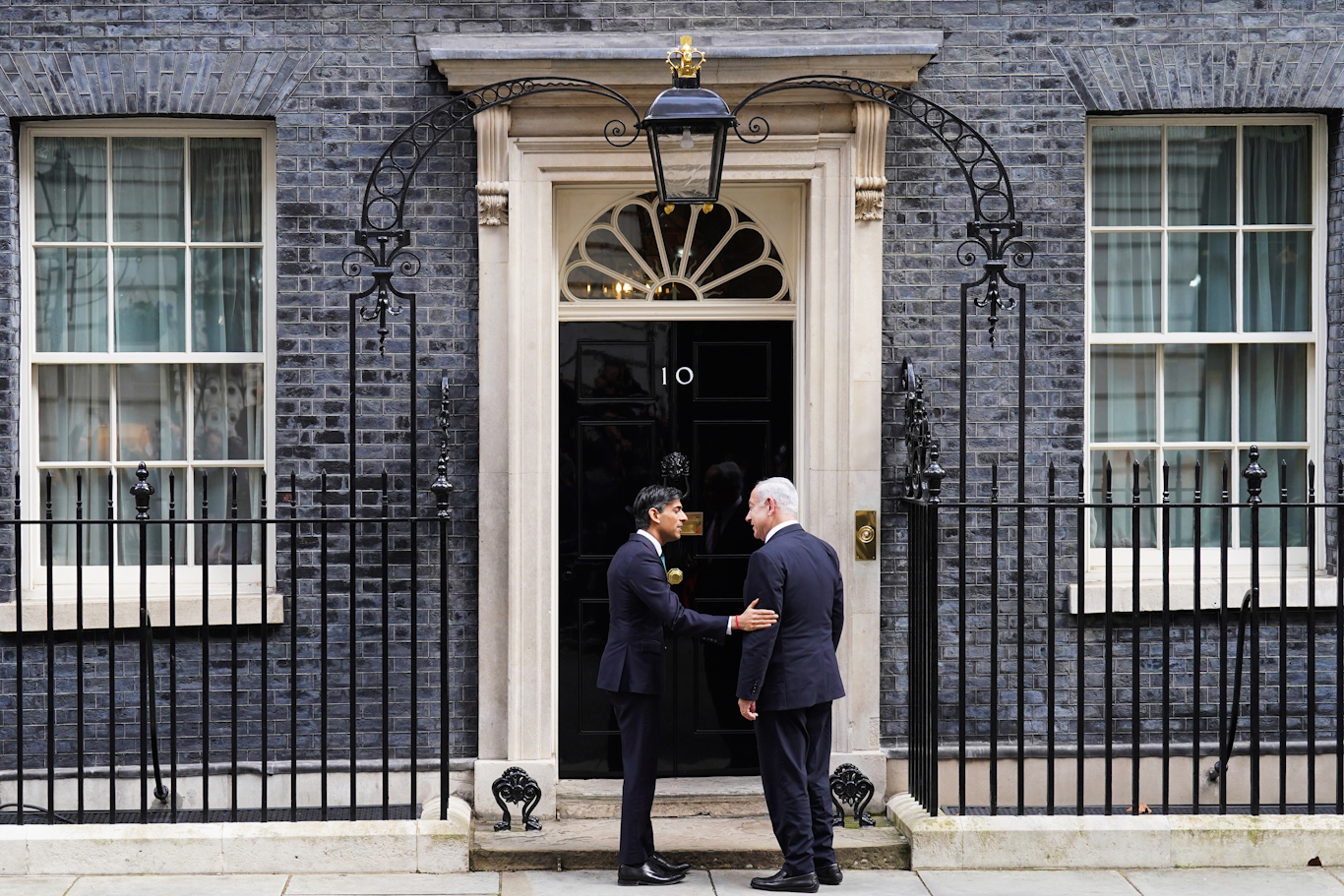In March, the United Kingdom and Israel signed an agreement strengthening ties in trade, technology, and the military. Known as the 2030 Roadmap for UK-Israeli Bilateral Relations, the British government lauded the deal as boosting the economy, but activists say it makes the U.K. complicit in apartheid while ignoring the realities on the ground.
The agreement promises to tackle a number of issues, including antisemitism and anti-Israel bias, stating, “the U.K. and Israel will work together to tackle the singling out of Israel in the Human Rights Council as well as in other international bodies.”
Currently, the UN’s Human Rights Council is investigating human rights violations in the occupied Palestinian territories and throughout 1948-occupied Palestine (or modern-day Israel). The ongoing probe has been slammed by Israeli politicians as “antisemitic.”
Additionally, the U.K. rejected using the term “apartheid” to describe Israel, despite several human rights organizations, including Human Rights Watch and Amnesty International, recently declaring it an apartheid state.
Opposition to the U.K.’s policy decision was swift, with several pro-Palestinian British groups denouncing it.
In a statement, Kamel Hawwash, Palestine Solidarity Campaign (PSC) chair, said:
This appalling paper erases Palestinians from the picture, making no reference to the Netanyahu Government’s intensification of the violation of their rights and Israel’s claim to the whole of historic Palestine in defiance of international law. In this moment, to promise to deepen relations with Israel rather than holding it accountable, gives Netanyahu a green light to continue entrenching Israeli apartheid policies.”
It is shameful that the UK government stands with this Israeli government and is complicit in the violence, racism, oppression and dispossession being enacted on Palestinians #EndApartheid #BDS #FreePalestine pic.twitter.com/AlWeoBd1P4
— PSC (@PSCupdates) March 24, 2023
“The British government has a responsibility to call Israel what it is — an apartheid state — and to impose sanctions on Israel for its flagrant and repeated violations of international law and systematic human rights abuse,” Friends of Al-Aqsa (FOA), a U.K.-based NGO advocating for Palestinian rights, told MintPress News, noting how 2023 has been one of the most violent years for Palestinians in decades.
Last year was the deadliest for Palestinians since 2004, with Israeli forces and settlers killing 146 Palestinians. This year is on track to becoming even more fatal, with 89 Palestinians killed in the first three months, according to UN data.

“It is utterly shameful that this government is instead choosing to strengthen economic and security ties with an apartheid state,” FOA said.
The deal also reasserts the U.K.’s objection to the Boycott, Divestment and Sanctions movement and its commitment “to ending any such campaigns by public bodies, including through legislation.”
The British government recently proposed an anti-boycott bill, which aims to prevent public bodies from “engaging in boycotts that undermine community cohesion…[and] making any boycott, divestment or sanctions decisions that aren’t in line with U.K. government foreign or economic trade policies.”
BREAKING: Na’amod went to Westminster this AM to protest the Govt’s draconian Boycott Bill. The bill will ban non-violent protest for Palestinian human rights & is being justified as a way to ‘protect’ Jewish people. This bad for Jews, bad for Palestinians & bad for democracy!
pic.twitter.com/5SfDlN2fKC
— Na’amod: British Jews Against Occupation
(@NaamodUK) February 28, 2023
UK-Israel Collaboration
Great Britain has a sordid history with Palestine, beginning with the notorious Balfour Declaration, a 1917 British pledge to establish a Jewish state in Palestine. The letter from then-foreign secretary Arthur Balfour, to Lionel Walter Rothschild, a leader in Britain’s Jewish community, arguably triggered the ethnic cleansing of Palestine by Zionist forces in the decades following. Since then, the country’s relationship with Israel has significantly cemented its complicity in Israel’s human rights violations.
Most notable is the arms trade between Israel and the U.K. According to War on Want, a British nonprofit aiming to combat the root causes of poverty, London approved nearly $500 million of military technology and arms exports to Israel from 2016 to 2021. F-16 fighter jets and Apache helicopters, which contain components manufactured by British arms company BAE Systems, have been used in Israeli attacks against Palestinians, such as in Israeli airstrikes on the besieged Gaza Strip. According to the U.K.-based Campaign Against Arms Trade, Britain also spends millions every year on “battle-tested,” meaning used in Israeli assaults on Palestinian weapons from Israeli companies.
The new U.K.-Israel deal suggests these arms deals will increase.
“Of deep concern is the fact that the roadmap includes a further strengthening of cyber-security relations,” PSC said in a statement. “The cybersecurity sector in Israel is interwoven with the military – with Israel being central to the development and export of military-grade spyware. This poses a danger to human rights across the world.”
Beyond military cooperation, British prime minister Rishi Sunak has significant business interests in Israel.
Infosys, an Indian IT firm founded by Sunak’s father-in-law N.R. Narayana Murthy, is linked to Israel’s military. Sunak’s wife, Akshata Murty, has a 0.93% stake in Infosys and collects £11.5 million (more than $14 million) in annual dividends from the company.

In 2012, Infosys signed a Memorandum of Understanding with Israel to boost cooperation between it and Israeli corporations.
The firm is co-directed by Israeli entrepreneur Uri Levine, who served in the Israeli Military Intelligence Unit 8200, an elite agency responsible for gathering private information about Palestinians. Infosys, as well as its subsidiaries, all employ former Israeli military personnel.
Yotam Kreiman, the current deputy chief of mission of Israel in Portugal, worked as a process specialist at Infosys in 2018 and, before that, was a combat trainer in the Israeli army. Eyal Cidon, who worked as a software engineering intern at Infosys in 2012, served in the Israeli army from 2007-2010.
Israeli subsidiaries, LivePerson, Panaya, and CloudEndure, are also tied to Israel’s military.
Reut Dror, who works as LivePerson’s business operation manager, was a major in the Israeli army and served for nearly eight years. Jaime Locketz, a current Israeli military spokesperson, worked as an internal communications specialist prior to joining the military. Dror Weiss, Panaya’s director of technology from 2009 to 2013, worked as a software engineer in the Israeli military. Tal Arnon, Panaya’s vice president of research and development, worked in the Israeli Army’s Military Intelligence Corps from 2004 to 2018 and then went on to become head of the military’s cyber business unit.
Infosys was also a key seed investor in CloudEndure, a tech company founded by Leonid Feinberg and Ofir Ehrlich, who both served in the Israeli army.
At a time when Israel is slammed with criticism, activists are decrying the U.K. for choosing to side with apartheid and a failing fascist state in exchange for military, technology, and financial connections.
Feature photo | Illustration by MintPress News
Jessica Buxbaum is a Jerusalem-based journalist for MintPress News covering Palestine, Israel, and Syria. Her work has been featured in Middle East Eye, The New Arab and Gulf News.
The post As UK Inks Trade Deal with Israel, Rishi Sunak’s Connections to Apartheid State Come Under Scrutiny appeared first on MintPress News.